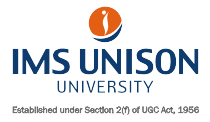Navigating the New Normal: Hospitality Management Post-COVID-19

The hospitality industry has been hardest hit by the COVID-19 pandemic, facing unprecedented challenges and being forced to adapt rapidly to new norms. As the world gradually emerges from the shadows of the pandemic, hospitality management is undergoing significant transformations. This evolution is evident from the curriculum updates in hotel management colleges in Uttarakhand and other parts of India, reflecting a shift towards more resilient and adaptive operational strategies.
This blog delves into the pivotal changes within the industry, explores the reinforced safety measures, examines the shift to online education, and contemplates the future outlook of hospitality management in a post-pandemic world.
The Impact of COVID-19 on Hospitality Management
The onslaught of COVID-19 brought the global hospitality industry to a near standstill, with travel restrictions and health concerns drastically reducing customer flow. Hotels, resorts, and restaurants faced severe losses, and many were forced to rethink their business models to survive. The pandemic underscored the sector's vulnerability, highlighting the need for flexibility and crisis management within the core skills taught in hospitality management programs.
New Safety Measures in the Industry
The hospitality industry has had to implement stringent safety measures to protect guests and staff in response to the pandemic. Enhanced cleaning protocols, contactless services, and health screening procedures have become standard. Technology is crucial in this new era, with mobile check-ins and digital menus minimising physical contact. Training for these new protocols is now a critical component of hospitality education, ensuring that future managers are prepared to implement and manage these measures effectively.
Shift to Online Education
The educational landscape, particularly for hotel management, has significantly shifted towards online learning. Hotel management colleges in Uttarakhand and beyond have adapted by offering more online courses, which provide flexibility and access to a wider range of students. This shift aligns with the safety measures necessitated by the pandemic and accommodates a growing preference for digital learning platforms. Online education in hospitality management focuses on delivering theoretical knowledge and soft skills while integrating virtual simulations for practical training.
Future Outlook for Hospitality Management
The future of hospitality management is poised for a transformation, blending traditional practices with innovative technologies. Sustainability will likely play a more prominent role, emphasising eco-friendly practices and local sourcing. Additionally, the digitalisation of services is expected to continue, enhancing guest experiences through personalised and technologically integrated services. As the industry recovers and adapts, the demand for skilled professionals who can navigate these changes will increase, underscoring the importance of advanced and flexible education systems.
Reinventing Customer Experience
In the new normal, the hospitality industry is reinventing how it engages with customers. Emphasis is being placed on creating more personalised experiences that can satisfy the heightened expectations of guests. Innovations such as virtual concierge services, room customisation via mobile apps, and enhanced loyalty programs are becoming more prevalent. These enhancements improve the customer experience and build trust by demonstrating a commitment to guest comfort and safety.
Financial Strategies for Recovery
The financial impact of the pandemic on the hospitality sector has been severe, prompting a need for robust financial strategies to foster recovery. Many establishments are revisiting their budget allocations, focusing on cost-effective solutions and diversifying their revenue streams. This includes expanding into new services such as virtual events, wellness retreats, and culinary experiences that can be delivered with minimal contact. Financial management courses are becoming more crucial in hospitality education, teaching upcoming managers how to navigate economic downturns effectively.
Enhancing Employee Wellbeing
The well-being of employees in the hospitality industry has taken centre stage. With the risks associated with the pandemic, ensuring the health and safety of staff is not just a necessity but a priority that also affects customer trust. Hotels and restaurants are now implementing more comprehensive health benefits, mental health support programs, and flexible working conditions to support their teams. Training programs are also incorporating modules on health and safety standards, stress management, and emotional support skills to prepare employees for these new challenges.
Adopting New Technologies
Technology adoption has accelerated in the hospitality industry, driven by the need for safer and more efficient operations. Technology is at the forefront of transforming hotel operations, from AI-driven analytics for predicting market trends to IoT-based devices for enhancing room services. Furthermore, integrating these technologies into the daily operations of hotels requires a skilled workforce proficient in digital tools, prompting hotel management programs to update their curricula to include advanced tech training.
Regulatory Compliance and Standards
Post-pandemic, there has been a surge in regulatory changes aimed at enhancing guest and staff safety. Compliance with these regulations is crucial for operational continuity and reputation management. Hospitality managers must stay informed about local and international health regulations and standards, including pandemic preparedness measures. Educational programs, therefore, emphasise regulatory compliance and teach students how to navigate the complex landscape of hospitality laws and standards.
Sustainability and Ethical Practices
Sustainability has moved from being a niche interest to a core component of business strategy within the hospitality industry, especially in the post-COVID-19 landscape. Consumers are increasingly aware of environmental issues and expect brands to act responsibly. This shift has prompted hotels, resorts, and other hospitality businesses to adopt greener practices such as reducing waste, conserving water, and utilising renewable energy sources.
Conclusion
As we navigate the new normal, the hospitality industry stands at a crossroads of challenge and opportunity. The changes implemented today will shape the future of hospitality management, making it more resilient and responsive to global crises.
Hotel management colleges in Uttarakhand and other parts of India, like IMS Unison University, are at the forefront of adapting their curricula to meet these new demands, preparing students to manage hotels and redefine hospitality in a post-COVID-19 world. The journey ahead is uncertain, but with the right tools and knowledge, the next generation of hospitality managers will be well-equipped to lead the industry towards a promising future.

